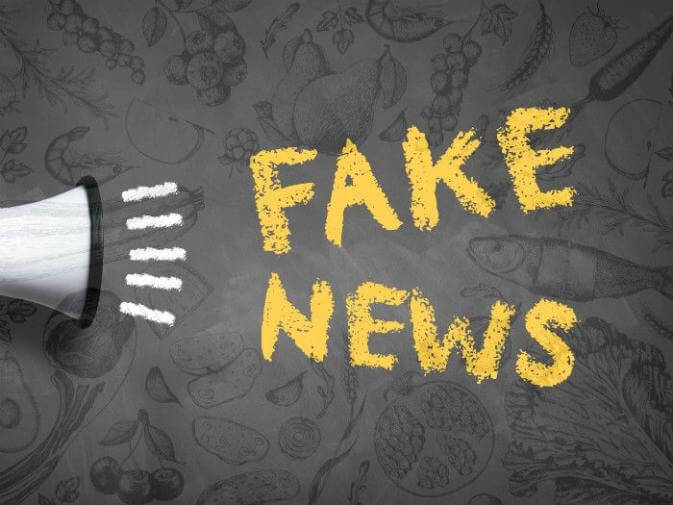How Fake Nutrition News Hurts Us All
Learning to think critically about nutrition claims can help make us better consumers of information in general.
Monica Reinagel, MS, LD/N, CNS

People sure do love to share nutrition information on social media. Unfortunately, a lot of what I see going by in my newsfeed is completely inaccurate. I do what I can to set the record straight.
No, margarine was not originally invented as a way to fatten up turkeys and no, it didn’t kill them.
No, you can’t tell the gender of a green pepper by counting its lobes.
No, a clear parasite was not found in a bottle of Dasani filtered water.
And, fortunately, there is no evidence that anyone has been injecting poison into bottled water, either.
How Fake Nutrition News Hurts Us All
Some of these stories create unnecessary worry among consumers. Some do serious financial damage to innocent companies. Others may appear relatively harmless. After all, who gets hurt counting the lobes of green peppers?
Perhaps we all do.
There’s a lot of unfiltered and unvetted information streaming at us—and not just about nutrition. Our willingness to believe and share information without considering its credibility or source can do a lot of damage.
And this is why I run the risk of irritating my friends and family with my compulsive fact-checking. Even if it’s a bit embarrassing, realizing that we’ve been taken in might make us a bit more skeptical when the next sensational story hits our feed.
Do Dates Prevent Heart Attacks?
Frequently, a quick search on Snopes.com is all it takes to put something down as a hoax. But Snopes could not help me in a recent exchange with a friend, who reposted a whimsical little video extolling the health benefits of dates.
“Dates are the world’s #1 food against heart attacks, strokes, and cholesterol,” the video claimed. Apparently, they also regulate high blood pressure, cleanse the blood vessels, and prevent blood clotting. Even better, consuming dates on an empty stomach in the morning will help you lose weight!
I gently pointed out to my friend that none of these claims were even remotely supported by evidence. In response, he posted a link to a website which corroborated these claims—and added several more. According to this website, dates also diminish allergic reactions, strengthen bones, and prevent abdominal cancer. In a spirit of open dialog, my friend invited me to post any links that I could find to either support or refute these claims.
Must We Rebut the Ridiculous?
The question isn’t whether I can find research to refute these claims. The responsibility to provide backup rests with those making the claims. And this website, which was created by a company that sells dates, didn’t offer much in the way of supporting evidence.
In fact, I could turn up no published research suggesting that eating dates has any effect on (or even correlation with) night blindness, heart attacks, stroke, bone health, bowel health, anemia, obesity, cancer, or any other disease.
These claims appear to be based entirely on the fact that dates contain Vitamin A, various B vitamins, calcium, iron, magnesium, potassium, fiber, and so on. But dates are not particularly good sources of these—or any—nutrients. A serving of dates provides just 1-2% of your daily requirement for most of these nutrients. There are literally hundreds of other fruits and vegetables that provide more nutrition per serving.
There is one nutrient where dates really do stand out: They contain more sugar than any other fresh fruit—almost twice as much as the next highest fruit. Then again, sugar is a nutrient that most of us don’t have to go out of our way to get enough of.
Should You Eat Dates?
Dates are delicious and exotic. It’s perfectly fine to enjoy them! Because they are uniquely high in sugar, it’s best to enjoy them in moderation. But the idea that they are nutritional powerhouses or disease fighting superfoods is ridiculous. And the fact that the source of these completely unsubstantiated assertions is a company that sells dates should be all it takes to know that we’re not dealing with a credible source.
Fighting this sort of misinformation is like trying to behead the mythical Hydra.
But here’s the thing: Fighting this sort of misinformation is like trying to behead the mythical Hydra. In the time it took me to rebut these ridiculous claims about dates, twelve more absurd nutrition articles have been posted online, and three of them have been reposted by my Aunt Sylvia.
My Not-so-Secret Agenda
As a colleague wrote to me the other day, “Supplying facts isn’t enough to immunize people against anti-facts. We have to help people learn how to evaluate and recognize the difference.” Because the next bit of misinformation is always just around the bend.
And that’s a big part of what I hope to accomplish in this podcast and my other work. Not only do I want to help people be smarter about their nutrition choices, I’d love to help people become more discerning consumers of information in general.
The same process that you see me apply to nutrition claims (being respectfully skeptical, checking the logic, seeking objective evidence, considering the source, looking for alternate explanations, and so on) can be applied to all sorts of topics.
Maybe, just maybe, by learning how to think critically about nutrition info in the media, we can learn to think more rationally about other information we encounter as well.
Before you internalize, act on, or disseminate any piece of information—on any subject—you owe it to yourself (and the world at large) to pause and consider how you might check to see if it’s actually true. In today’s environment of information overload and instant communication, that pause has never been more crucial.

